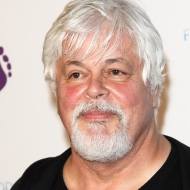
By Michael Oliveira
He’s been called irresponsible, reckless and an eco-terrorist. Former Newfoundland and Labrador premier Danny Williams called him “a vile, disgusting excuse for a human being.
Canadian animal lover Paul Watson is the star of the Emmy-nominated “Whale Wars,” the top-rated show on Animal Planet, which kicks off its fourth season on Sunday at 9 p.m. ET/PT.
The documentary-style show follows Watson and his crew of fellow eco-crusaders in the Sea Shepherd Conservation Society as they fight to block Japanese ships from whaling.
This season recounts a successful campaign for the crew, which forced the whaling ships — which claim to capture whales for scientific purposes, their only exemption under international law — to end their hunt early.
Japan’s fisheries ministry has said ships went home with only a fifth of the 850 whales they expected to catch, due to Watson’s “unforgivable” actions.
“It’s our most successful season, we drove them out of the Southern Ocean whale sanctuary a month and a half early and … I don’t think they’ll be back next year,” Watson said in an interview.
“Our objective was to shut down the Japanese whaling fleet, directly intervene, and uphold internal conservation law … which is what we were able to achieve.”
Watson attributes the show’s strong ratings to the environmental conscience of viewers, who want to see abuses stopped. The exciting, confrontational nature of their encounters with the whaling ships doesn’t hurt either.
“People sometimes feel frustrated about what’s going on in our oceans and environment and ‘Whale Wars’ shows that ordinary people can take action and make things happen,” he said.
“We do what we do with the resources we have available to us, within the boundaries of the law and practicality, and that’s always been our approach.
“Of course we get a lot of criticism too but that doesn’t really bother us too much.”
Watson made a lot of enemies in Newfoundland and the Maritimes with his opposition to the annual seal hunt.
In 2008, two crew members of a Sea Shepherd Conservation Society ship, the Farley Mowat, were charged and convicted of interfering with the hunt. The ship was seized by the RCMP and later sold by the federal government.
Watson also sparked controversy when he commented on the deaths of four seal hunters that same hunting season.
“The Sea Shepherd Conservation Society recognizes that the deaths of four sealers is a tragedy but Sea Shepherd also recognizes that the slaughter of hundreds of thousands of seal pups is an even greater tragedy,” he said.
Watson now says he’s done protesting Canada’s seal hunt given that the industry is struggling to sustain itself.
“The seal hunt is dead commercially, I think we’ve achieved what we needed to achieve there,” he said.
“The money isn’t there. The key to all of this is always economics, you can’t appeal to ethics and morality, you appeal to the pocketbook. Commercially the seal hunt is dead … so I’m not going back there.”
Watson currently has cameras following his crews for what could be season 5 of “Whale Wars.” His ships are chasing pilot whale hunters in the Faroe Islands and bluefin tuna poachers off the coast of Libya.
“I’ve always felt the camera is the most powerful weapon in the world and that’s what we’re trying to use to our advantage,” he said.
Article courtesy of ACL/London Ent/Splash News

